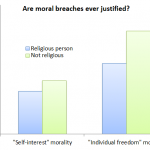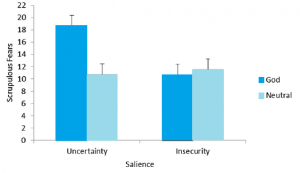Back in 2010, I made a prediction: that the financial crisis of 2008 would lead to an uptick in religion. It seemed reasonable enough. After all, the study I quoted showed how, in the USA, religious beliefs and attendance acted as a buffer against the stress of poverty.
And I wasn’t flying out on a limb, either. According to the blurb for the British Sociological Association’s 2014 meeting of the Sociology of Religion Study Group, “A long-standing assumption in the sociology of religion is that there is a correlation between religious resurgence and intense moments of political economic and socio-cultural crisis. We are living at such a moment of crisis now.”
Well, I was wrong, as the chart below shows.

It comes from some new research by David Voas, at the University of Essex, and Steve Bruce, and the University of Aberdeen, both in the UK.
They looked at UK Church attendance figures. To minimise the effects of population changes and immigration, they excluded ethnic minorities and showed data as a percentage of the population in each year. The result shows a steady decline, which is all the more remarkable as the ethnic British population is ageing rapidly (older people tend to be more frequent churchgoers).
They also looked at a wide range of other data series stretching back to the start of the 20th century, including Church attendance and membership and Sunday School attendance, and attendance at services on Easter Sunday. And also (because they kept remarkably good records) detailed figures of Methodists and Scottish Presbyterians.
All these records told the same story. No matter which way you look at it, religion in the UK has faced a steady, inexorable decline over the course of the 20th century. The few blips just look like random fluctuations.
Not even the traumatic events of the two world wars and the great depression were able to slow the decline.
The authors conclude that “there is no obvious association between social crises and religious interest in the UK.” They go on to point out the ‘obvious’ explanation – that if you are not religious, then going through a period of adversity is not going to cause you to suddenly change your whole world-view.
In fact, religious and non-religious people could have exactly opposite reactions to horrific life experiences. As examples, they say;
… one might consider the divergent responses of two decorated Great War soldiers: George Fielden MacLeod and Robert Graves. McLeod decided to enter the ministry and later founded the Iona Community (Ferguson 2001). Robert Graves lost his inherited Anglicanism and gave his well-informed response to the ‘no atheists in fox holes’ assertion when he wrote: ‘Hardly one soldier in a hundred was inspired by religious feeling of even the crudest kind. It would have been difficult to remain religious in the trenches …’
They conclude, as you might expect, that social crises don’t lead to religious revivals. But they actually draw an even bigger conclusion.
And that’s that changes in demographics of religious belief are not driven by events at all, but rather by steady social trends. Which means that the only way you can understand changes in religious belief is by looking at the big picture, and not by trying to analyse events and consequences.
You need to take a sociological view, not a historical one.
The only caveat, really, is that this study focuses exclusively on the UK. An analysis of the aftermath of the 1998 Indonesian financial crisis found that it did result in an increase in religious activity.
So maybe the idea that social crises is not entirely dead. Perhaps it just doesn’t apply in wealthy countries, which have a social safety net and are relatively secular.
Perhaps social crises don’t lead to religious revivals if you can get your safety net without the inconvenience of going to the temple!
![]() Voas, D., & Bruce, S. (2016). Do Social Crises Cause Religious Revivals? What British Church Adherence Rates Show Journal of Religion in Europe, 9 (1), 26-43 DOI: 10.1163/18748929-00901001
Voas, D., & Bruce, S. (2016). Do Social Crises Cause Religious Revivals? What British Church Adherence Rates Show Journal of Religion in Europe, 9 (1), 26-43 DOI: 10.1163/18748929-00901001













